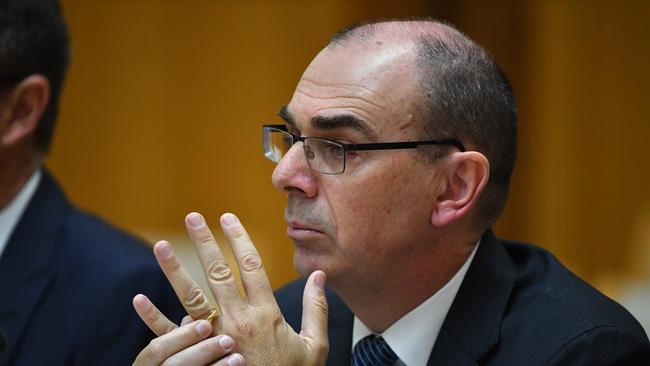Prudential regulator to prioritise financial system resilience
Geopolitical tensions from the invasion of Ukraine, rising inflation and increasing interest rates will be front of mind for APRA as it looks to future proof the financial services industry.

Business
Don't miss out on the headlines from Business. Followed categories will be added to My News.
The prudential regulator will continue to prioritise the resilience of the financial services industry, as it deals with the impact of Covid-19, geopolitical tensions from the invasion of Ukraine, rising inflation and increasing interest rates.
In its updated corporate plan for 2022-23, the Australian Prudential Regulation Authority said it had implemented a range of measures over the last few years to strengthen the banking system.
Notably, the new capital framework designed to formalise unquestionably strong levels of capital would come into effect in January 2023.
APRA chair Wayne Byres said the financial system remained stable and resilient, despite the economic challenges of the past two years.
“In part, this is the result of many years of preparatory work by APRA and the institutions we supervise,” Mr Byres said.
“However, we cannot afford to be complacent.
“Global economic conditions are forecast to deteriorate over the period ahead, exacerbated by the ongoing war in Ukraine, while the increases in cost of living and recent flooding events remind us that Australia is facing its own turbulence.”

APRA issues annual updates of its four-year corporate plan, with the latest update framed with two overriding themes: “protecting the Australian community today” and working to ensure that the Australian financial system is “prepared for tomorrow”.
The regulator said it would continue to protect the community by preserving the financial and operational resilience of the nation’s banks, insurers and superannuation funds.
It would modernise the prudential architecture, and improve data-driven decision-making.
As to the challenges of tomorrow, it would focus on the evolving financial landscape, respond to the impact of new financial activities and participants, and help find solutions to important challenges.
The challenges included retirement income products and longevity solutions, insurance accessibility and affordability, and the financial risks associated with climate change.
As part of pushing trustees to improve member outcomes, APRA said it had been eradicating unacceptable performance and reducing fees.
In part, this had been driven by increased transparency from the MySuper and Choice heatmaps and the first annual performance test.
Of the 13 MySuper products to fail the first annual performance test, 10 had either merged, exited, or committed to transfer their members to a better performing fund.
Over recent years, APRA had also put in place the foundations to transform governance, risk culture, remuneration and accountability practices.
One of the main tenets was the 2021 release of the prudential standard on remuneration, aimed at ensuring financial institutions have remuneration arrangements that appropriately incentivise individuals to prudently manage risks.
There are also consequences for poor risk outcomes, with a number of related recommendations from the financial services royal commission addressed.
APRA said it would extend the use of its risk culture survey to assess, benchmark and provide insights across financial institutions, including identifying blind spots and areas for improvement.
Importantly, the regulator said it would continue its multi-year project to modernise the prudential architecture, working with stakeholders to test and explore new approaches and ideas.
“There has been an acceleration of change within the financial sector; communication and payments are increasingly being digitised and business models are evolving in response to technological innovation and consumer expectation,” APRA said.
Over the year ahead, the regulator said it would develop a handbook so directors can better understand their obligations, and establish an advisory panel to provide its perspective on initiatives as they are shaped, particularly in regard to digitalisation.
It would also engage with regulated entities and other stakeholders through a survey and targeted workshops to better understand any limitations of the current framework, streamline existing standards and guidance, and explore how to digitise APRA’s standards, guidance, and information papers.
This would create a digital rule book capable of being navigated by interested parties.
More Coverage
Originally published as Prudential regulator to prioritise financial system resilience





